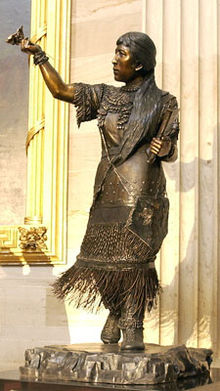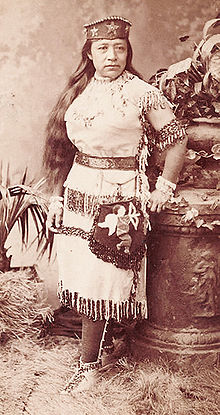- Sarah Winnemucca
-
 Statue of Sarah Winnemucca by Benjamin Victor (NSHC statue)
Statue of Sarah Winnemucca by Benjamin Victor (NSHC statue)
Sarah Winnemucca (born Thocmentony or Tocmetone,[1] Paiute: Shell Flower) (ca. 1844 – October 17, 1891) was a prominent female Native American activist and educator, and an influential figure in the United States' nineteenth-century Indian policies. [2] Winnemucca was notable for being the first Native American woman known to secure a copyright and to publish in the English language.[citation needed] She was also known by her married name, Sarah Winnemucca Hopkins, under which she was published. Her book, Life Among the Paiutes: Their Wrongs and Claims, is an autobiographical account of her people during their first forty years of contact with explorers and settlers.
Sarah was a person of two worlds. At the time of her birth her people had only very limited contact with Euro-Americans; however she spent much of her adult life in white society. Like many people of two worlds, she may be judged harshly in both contexts. Many Paiutes view her as a collaborator who helped the U.S. Army kill her people. Modern historians view her book as an important primary source, but one that is deliberately misleading in many instances. Despite this, Sarah has recently received much positive attention for her activism. She was inducted into the Nevada Writers Hall of Fame in 1993, and in 2005 a statue of her by sculptor Benjamin Victor was added to the National Statuary Hall Collection in the U.S. Capitol.
Contents
Early life
Born "somewhere near 1844" at the Humboldt Sink in what is now western Nevada, Sarah Winnemucca was the daughter of Chief Winnemucca (Poito) and Tuboitonie. Although she claimed that her father was chief of all the Northern Paiute (and she was therefore often called the "Paiute Princess" by the press), the Paiute had no centralized leadership and her father, though influential, was the leader of a small band.
Sarah's grandfather, Tru-ki-zo or Truckee (meaning "good" in the Paiute language), was enthusiastically friendly towards white people. Some say that he was called "Truckee" because it means "good" in the Paiute language, while others say that he got his name because he shouted "Tro-kay" which means "hello." He guided John C. Frémont during his 1843–45 survey and map-making expedition across the Great Basin to California. Later he fought in the Mexican-American War, earning many white friends. Although Sarah was initially terrified of white people, her grandfather took her with him on a trip to the Sacramento area (a trip her father refused to make), and later placed her in the household of William Ormsby of Carson City, Nevada to be educated. Sarah Winnemucca soon became one of very few Paiutes in Nevada able to read and write English.
William Ormsby was later killed in action at the first battle of the Paiute War when the militia force he led was annihilated by a Paiute force led by Sarah's cousin Numaga. Sarah's book tells how her brother Natchez unsuccessfully tried to save Ormsby by faking his death. Her father and brother both fought on the Paiute side.
After the war, Sarah's family moved to the Malheur Reservation which was designated a reservation for the Northern Paiute and Bannock by a series of Executive Orders issued by President Ulysses S. Grant. Sarah taught in a local school and acted as interpreter for Indian Agent Samuel Parrish. Parrish worked well with the Paiute, and established a coherent and well-managed agricultural program.
Bannock War
After four years, Parrish was replaced by agent William Rinehart. He failed to pay Paiute workers for agricultural labor in commonly held fields, and alienated many tribal leaders. Conditions at the Malheur Reservation quickly became intolerable. Sarah's book tells how the Indian Agent sold many of the supplies intended for the people to local whites. Much of the good land on the reservation was also illegally expropriated by white settlers. In 1878 virtually all of the people on the reservation left it. The Bannock who left began raiding isolated white settlements in southern Oregon and Northern Nevada, triggering the Bannock War. The degree to which Northern Paiute people participated with the Bannock is unclear. Sarah claims in her book that her family and several other Paiute families were held hostage by the Bannock during the war.
During the Bannock War, Sarah worked as a translator for the U.S. Army. She also describes scouting and message-carrying duties that she performed on behalf of the Army. Her description of engagements is frequently comical—according to her account both the Bannock and the Army soldiers liked each other so much that they rarely shot to kill. Sarah was highly regarded by the officers she worked for, and her book includes letters of recommendation from several of them. Sarah also thought highly of those officers, and advocated military administration of the reservations.
Yakama Reservation
 Sarah Winnemucca – daughter of Chief Winnemucca
Sarah Winnemucca – daughter of Chief Winnemucca
Following the Bannock War, the Northern Paiute bands she was associated with were deemed untrustworthy and forced to march to the Yakama Indian Reservation (in Washington Territory), where they endured great deprivation. Sarah went there with them to serve as a translator, although as she had a job she was not required to live on a reservation. Due to their experiences there, she began to lecture on the plight of her people across California and Nevada. During the winter of 1879 and 1880, she and her father visited Washington and gained permission from Secretary of the Interior Carl Schurz for the Paiutes to return to Malheur at their own expense. However, this promise went unfulfilled for years.
- Knowing the temper of the people through whom they must pass, still smarting from the barbarities of the war two years previous, and that the Paiutes, utterly destitute of everything, must subsist themselves on their route by pillage, I refused permission for them to depart . . . and soon after, on being more correctly informed of the state of affairs, the Hon. Secretary revoked his permission though no determination as to their permanent location was arrived at. This was a great disappointment to the Paiutes and the greatest caution and care was necessary in dealing with them.
- Report of Yakama Agent, James H. Wilbur
- Annual Report of the Commissioner of Indian Affairs for the Year 1881, p. 174 and 175.[3]
Lectures and writing
 Sarah Winnemucca
Sarah Winnemucca
While lecturing in San Francisco, California, Sarah met and married Lewis H. Hopkins, an Indian Department employee (there is some indication that she had a previous husband). In 1883, they traveled east where Sarah Winnemucca Hopkins delivered nearly three hundred lectures. In Boston, the sisters Elizabeth Peabody and Mary Peabody Mann, wife of the educator Horace Mann, began to promote her speaking career. The latter helped her to prepare her lecture materials into Life Among the Piutes, which was published in 1883 (1994 edition: ISBN 0-87417-252-7). Sarah's husband supported his wife's efforts by gathering material for the book at the Library of Congress. However, her husband's tuberculosis and gambling addiction left Hopkins with little financial reward for all her efforts.
After returning to Nevada, Sarah Winnemucca Hopkins built a school for Indian children which was to promote the Indian lifestyle and language. The school operated briefly, until the Dawes Severalty Act of 1887 required Indian children to attend English-speaking boarding schools. Despite a bequest from Mary Peabody Mann and efforts to turn the school into a technical training center, Sarah's funds were depleted by the time of her husband's death in 1887, and she spent the last four years of her life retired from public activity. She died at her sister's home in Henry's Lake, Idaho of tuberculosis.
Legacy
In 2005, Sarah Winnemucca's statue was added to the National Statuary Hall Collection in the U.S. Capitol by the state of Nevada. In 1994, a Washoe County elementary school was named in Winnemucca's honor.
References
- ^ Ontko, Gale. Thunder Over the Ochoco, Volume I: The Gathering Storm. Page 404. Bend, OR: Maverick Publications, Inc., 1997.
- ^ Hopkins, Sarah Winnemucca. Life Among the Piutes: Their Wrongs and Claims. Reno: University of Nevada Press, (reprint), 1994.
- ^ "Today in History: October 14." The Library of Congress. (retrieved 11 April 2010)
External links
- Life Among the Piutes: Their Wrongs and Claims by Sarah Winnemucca Hopkins (1883). Full text online.
- Biography, from the website of Nevada Women's History Project at the University of Nevada, Reno
- Voices from the Gaps: Sarah Winnemucca Hopkins, a biography from a University of Minnesota website
- Biography from the National Women's Hall of Fame website
- Nevada Historical Marker 143 on Thocmetony, from a state of Nevada website
- Nevada Writers Hall of Fame
Categories:- Paiute people
- 1844 births
- 1891 deaths
- American memoirists
- Native American activists
- Native American writers
- Native American history of Nevada
- Writers from Nevada
- Writers from Oregon
- People from Malheur County, Oregon
- Indigenous people of the Pacific Northwest
- Paiute War
- Native American female activists
Wikimedia Foundation. 2010.

